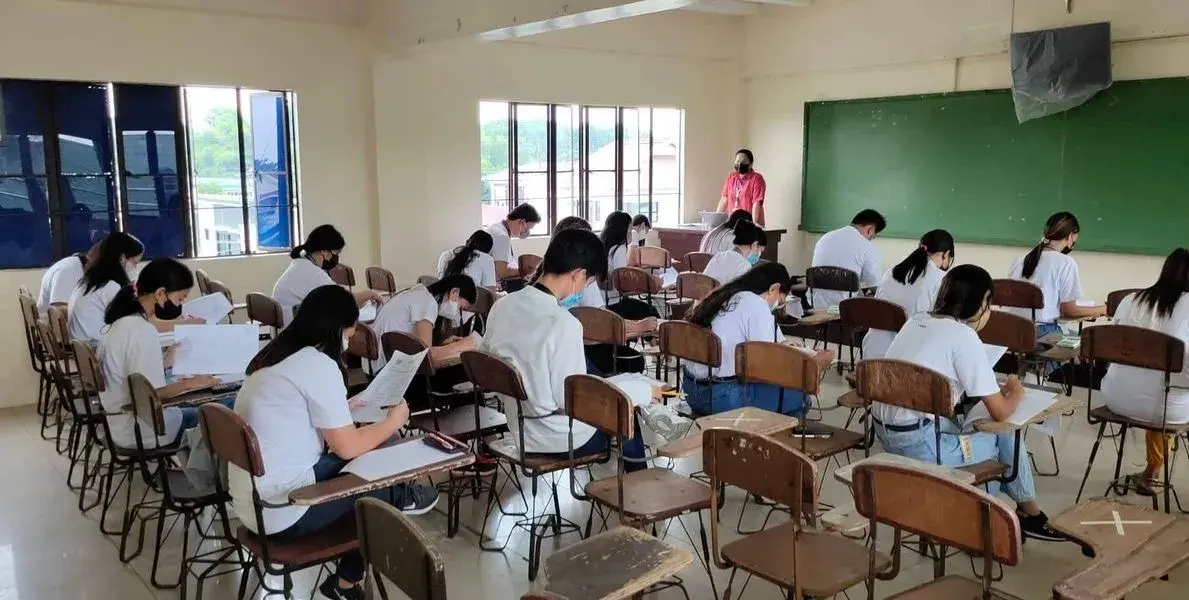
Disadvantaged students no longer have to feel the shame of walking out of their classrooms during examinations due to unpaid school fees with the signing of the “No Permit, No Prohibition Act” this year.
The “No Permit, No Exam Prohibition Act” (Republic Act 11984) was signed into law last March 11, 2024, guaranteeing Filipino students’ right to education.
ICYMI: New Law Waives Entrance Exam Fees for Private Colleges in the Philippines
Through the new law, private and public educational institutions are required to allow disadvantaged students to take their periodic and final examinations even when they have unpaid tuition and other school fees.
The new law requires the Department of Social Welfare and Development (DSWD) to issue a certificate acknowledging that a student is under a disadvantaged status. The DSWD has the authority to examine and assess if the reason for the student’s status is valid.
The DSWD is responsible for defining further and setting the criteria and requirements for students to be considered “disadvantaged” by calamities, emergencies, force majeure, and other justifiable reasons. However, five months after the law has been signed, the criteria and requirements for the status have yet to be released.
Issuing a promissory note before the examination is also required to be “fair to the educational institution,” according to the law.
Furthermore, despite allowing disadvantaged students to take the examination, schools retain the right to withhold records and credentials when fees are left unpaid. Schools, however, can exercise the option to voluntarily allow students with unpaid dues to take examinations and claim their records and credentials even without a certification.
Violators of the “No Permit, No Examination Prohibition Act” will receive administrative sanctions from government agencies such as the Department of Education, Commission on Higher Education, or Technical Education and Skills Development Authority.
Legislative Journey of New Law
The “No Permit No Exam Prohibition Act” of March 2024, traces its beginnings from several versions of the legislative bill.
Senate Bill 1359 was passed in February 2023 while House Bill 7584 was approved on final reading in May 2023. HB 6483 and 7584 were consolidated with SB 1359 on December 6, 2023.
The first bill prohibiting the “No Permit, No Exam” policy was filed by Kabataan party-list representative Mong Palatino in 2007 and continuously refiled due to demands against the school practice. Eventually, DepEd Order No. 15 was released in 2010 encouraging schools to desist from the policy. SB 1235, the precursor of SB 1359, was filed in 2016.
Expectations vs Reality
Kabataan party-list Rep. Raoul Manuel scrutinizes the requirement of a certification from the DSWD as proof that students are incapable of paying before they take their examinations. He also pointed out that even with this new policy to lessen the financial burden on students, the government still approved the annual tuition fee increase.
Cost of Private Education
Private education is not cheap and charges various fees. In the Philippines, tuition fees range from PHP30,000 to PHP100,000 for grade school alone. This has become a burden for many Filipino families who want quality education for their children.
Tuition fees also differ depending on the student’s year level, usually increasing as they move up to a higher year. Just like consumer goods, the price of education also experiences inflation. Many private schools also increase their tuition fee by a certain percentage each academic year.
Aside from tuition fees, additional fees are added to the yearly educational expenses of students such as miscellaneous fees, laboratory fees, educational trip fees, and extracurricular fees. On top of all these, sending children to school also costs money as students need allowances to cover their transportation. Food, uniforms, textbooks, and school supplies are among the other expenses that parents have to cover when their children go to school.
”I was not able to take the exam on time”
In the past, narratives of disadvantaged students being barred from taking examinations due to unsettled school fees were common. Usually, these students are already all set and prepared for their exams and are already in their designated classrooms waiting for their examinations to begin. As examination papers are disseminated, they are informed of their unpaid dues and are asked to leave, causing stress and embarrassment to disadvantaged students.
In an interactive post by KAMI, netizens commented and expressed their experiences of being barred from taking their examinations. A netizen shared that “Hindi na ako pumasok at umuwi sa bahay. Alam kong walang pera mga magulang ko kaya tumigil ako sa pag aaral (I didn’t go to school anymore and went home instead. I knew that my parents did not have money which was why I stopped schooling).
Another reminisced that it disheartened her as she was still young and did not understand the situation, causing her to resent her parents. Many comments also showed that disadvantaged students constantly issue promissory notes for every exam.
SHARE this article to help others understand the new law and help build good school environments!
Be part of our vibrant Good News Pilipinas community, celebrating the best of the Philippines and our global Filipino heroes. As winners of the Gold Anvil Award and the Lasallian Scholarum Award, we invite you to engage with us and share your inspiring stories. For stories Making Every Filipino Proud, reach out to GoodNewsPilipinas.com via Facebook, Twitter, Instagram, TikTok, YouTube, and LinkedIn. LinkTree here. Let’s spread good news together!
The post New Law Ensures Disadvantaged Students Can Take Exams Despite Unpaid Fees appeared first on GoodNewsPilipinas.com.
Source: Good News Pilipinas
0 Comments